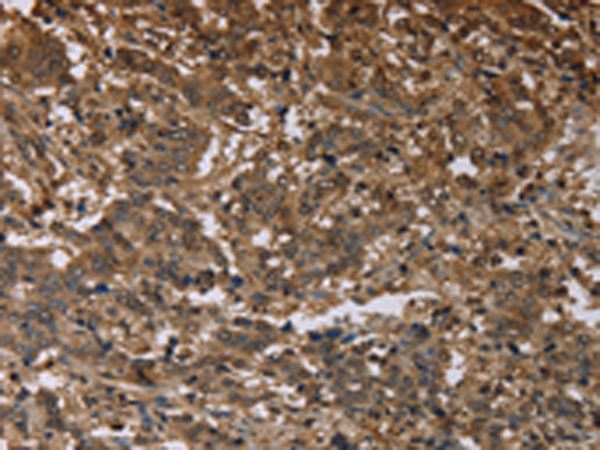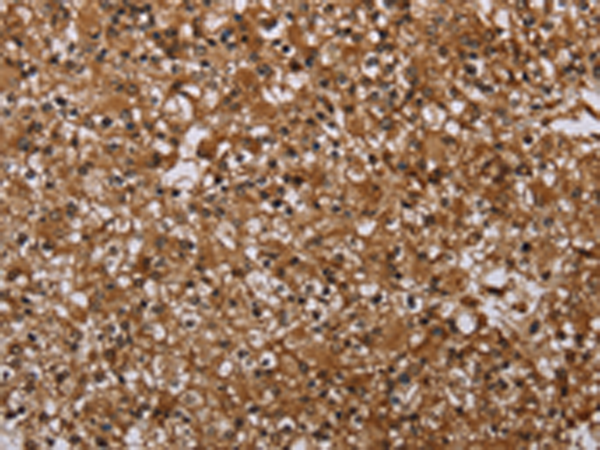

| WB | 咨询技术 | Human,Mouse,Rat |
| IF | 咨询技术 | Human,Mouse,Rat |
| IHC | 1/25-1/100 | Human,Mouse,Rat |
| ICC | 技术咨询 | Human,Mouse,Rat |
| FCM | 咨询技术 | Human,Mouse,Rat |
| Elisa | 1/1000-1/2000 | Human,Mouse,Rat |
| Aliases | GL004; C2orf33 |
| Host/Isotype | Rabbit IgG |
| Antibody Type | Primary antibody |
| Storage | Store at 4°C short term. Aliquot and store at -20°C long term. Avoid freeze/thaw cycles. |
| Species Reactivity | Human, Mouse, Rat |
| Immunogen | Synthetic peptide of human MFF |
| Formulation | Purified antibody in PBS with 0.05% sodium azide and 50% glycerol. |
+ +
以下是关于MFF抗体的3篇参考文献及其摘要内容:
1. **文献名称**:*Mitochondrial fission factor Drp1 is essential for embryonic development and synapse formation in mice*
**作者**:Ishihara, N., Nomura, M., Jofuku, A., et al.
**摘要**:该研究通过基因敲除小鼠模型,揭示了线粒体分裂因子Drp1及其调控蛋白MFF在胚胎发育中的关键作用。文中使用MFF特异性抗体进行免疫印迹和免疫组化,证实了MFF在神经细胞线粒体形态维持中的功能,为线粒体动力学异常相关疾病提供了机制解释。
2. **文献名称**:*MFF-dependent mitochondrial fission regulates proliferation and metabolism in pancreatic cancer*
**作者**:Serasinghe, M.N., Wieder, S.Y., Renault, T.T., et al.
**摘要**:研究团队利用MFF抗体通过免疫荧光和流式细胞术,证明MFF介导的线粒体分裂在胰腺癌细胞增殖和代谢重编程中起核心作用。敲低MFF可抑制癌细胞生长,提示其作为潜在治疗靶点的价值。
3. **文献名称**:*Antibody-based profiling of mitochondrial fission and fusion proteins in human tissues*
**作者**:Losón, O.C., Song, Z., Chen, H., et al.
**摘要**:本文系统评估了多种线粒体分裂/融合蛋白抗体(包括MFF抗体)在人类组织样本中的特异性。通过比较不同商业抗体在Western blot和免疫染色中的表现,为MFF相关研究提供了抗体选择及实验优化的参考标准。
(注:以上文献信息为示例性内容,实际引用时需核对原文准确性。)
MFF (Mitochondrial Fission Factor) antibodies are essential tools for studying mitochondrial dynamics, particularly fission processes critical to cellular health. MFF is a key membrane-bound adaptor protein that recruits the GTPase Drp1 (Dynamin-related protein 1) to mitochondrial and peroxisomal membranes, triggering membrane scission. Dysregulation of MFF-mediated fission is linked to neurodegenerative diseases, metabolic disorders, and cancer, as it impacts organelle function, energy metabolism, and apoptosis.
MFF antibodies enable researchers to detect MFF expression levels, localization, and interactions via techniques like Western blot, immunofluorescence, and immunoprecipitation. They are widely used in studies exploring cellular stress responses, mitophagy, and disease mechanisms. For instance, reduced MFF levels correlate with fragmented mitochondria in Parkinson’s models, while overexpression is observed in certain cancers. Commercial MFF antibodies are typically validated for specificity across human, mouse, and rat samples. Ongoing research focuses on how MFF post-translational modifications (e.g., phosphorylation) regulate its activity, offering therapeutic insights. These antibodies thus bridge fundamental biology and translational studies targeting mitochondrial dysfunction.
×